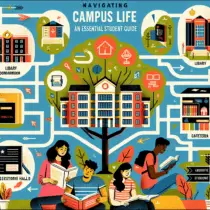Introduction
Are you dreaming of pursuing higher education abroad but worried about the financial burden? Look no further! In this article, we will guide you through the world of fully funded scholarships and help you turn your dreams into reality. With ample opportunities available, navigating the scholarship landscape can be both perplexing and exciting. By understanding the process, requirements, and strategies, you can enhance your chances of securing a fully funded scholarship. Read on to discover how to make your educational aspirations come true!
Before delving into the details, it is important to note that fully funded scholarships cover all aspects of your education, including tuition fees, accommodation expenses, travel costs, and even living allowances. They are awarded based on various criteria such as academic excellence, leadership potential, and personal accomplishments. These scholarships are highly competitive but offer life-changing opportunities for deserving candidates.
Researching Scholarship Options
The first step towards realizing your dream is thorough research. Start by exploring reputable scholarship databases such as Chevening Scholarships, Fulbright Program, and Erasmus+ Scholarships. These platforms provide comprehensive information about various fully funded scholarships offered by governments, universities, international organizations, and private institutions.
Additionally, reach out to your school’s career counseling office or academic advisors who can guide you towards suitable options based on your field of study and career goals. Connecting with alumni who have previously received fully funded scholarships can also provide valuable insights and recommendations.
Preparing a Stellar Application
The application process for fully funded scholarships typically involves multiple stages including written essays/personal statements, recommendation letters, interviews (in person or virtual), and sometimes standardized tests like GRE or TOEFL. To increase your chances of success:
- Showcase your achievements: Highlight your academic accomplishments, extracurricular activities, community involvement, and any awards or accolades you have received. Be sure to present a well-rounded picture of yourself.
- Write a compelling personal statement: Use this opportunity to demonstrate your passion for the subject you wish to study, explain why you are a deserving candidate, and outline how the scholarship will help you achieve your goals.
- Select strong recommenders: Reach out to individuals who know you well academically or professionally and can provide detailed insights into your abilities and potential. Provide them with ample time to write thoughtful letters of recommendation.
- Prepare for interviews: Research common interview questions, practice answering them confidently, and articulate your motivations clearly. Showcase your ability to contribute positively to the scholarship program.
Identifying Eligibility Criteria
To avoid wasting time applying for scholarships for which you are not eligible, carefully review the eligibility criteria provided by each scholarship program. Common eligibility requirements include:
- Academic Excellence: Most fully funded scholarships require a minimum GPA or equivalent academic performance.
- English Proficiency: Scholarships offered in English-speaking countries often require applicants to demonstrate proficiency through standardized tests like IELTS or TOEFL.
- Nationality Restrictions: Some scholarships are specifically open only to students from certain countries or regions.
- Degree Level: Scholarships may be available for undergraduate, postgraduate, or doctoral studies. Ensure you meet the required degree level for each scholarship opportunity.
Tapping into Alternative Funding Sources
While fully funded scholarships are a fantastic option, they are highly competitive. To enhance your chances of securing funding, consider exploring alternative funding sources:
- Partial Scholarships: Partial scholarships cover a portion of your educational expenses. Although they require additional funding, they can still significantly reduce the financial burden.
- Financial Aid from Universities: Many universities offer financial aid packages to international students based on need or merit. Explore these options directly with the universities you are interested in.
- Government Sponsorship: Some governments provide financial assistance to outstanding students wishing to study abroad. Research if your home country offers any such programs.
- Crowdfunding and Grants: Consider crowdfunding platforms or grants provided by non-profit organizations. These can help supplement your scholarship applications.
Frequently Asked Questions (FAQ)
Q: How early should I start researching for fully funded scholarships?
A: It is recommended to start researching at least one year before you plan to commence your studies. This allows ample time for preparation and application.
Q: Are fully funded scholarships only available for specific fields of study?
A: No, fully funded scholarships are available for a wide range of fields including STEM, arts, humanities, business, and more.
Q: Can I apply for multiple fully funded scholarships simultaneously?
A: Yes, it is generally permissible to apply for multiple scholarships as long as you meet the eligibility criteria and fulfill the application requirements for each scholarship program.
Q: Is there an age limit to apply for fully funded scholarships?
A: While some scholarships may have age restrictions, many do not have an upper age limit. It is best to review the eligibility criteria of each scholarship program to determine if there are any age restrictions.
Q: Do I have to repay fully funded scholarships?
A: Fully funded scholarships are typically provided as grants and do not require repayment. However, it is important to fulfill any obligations specified in the scholarship agreement, such as maintaining a certain academic performance or returning to your home country after completing your studies.






